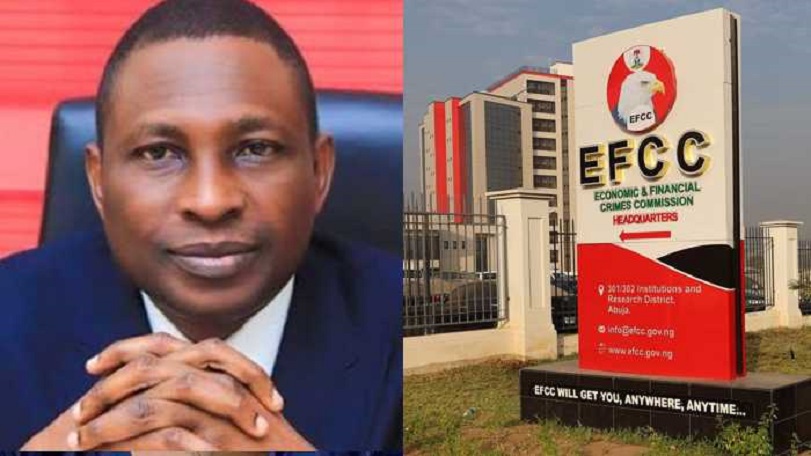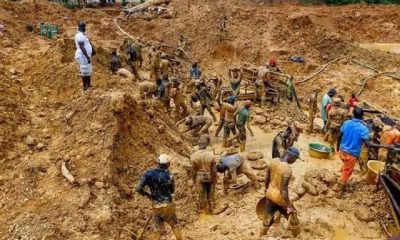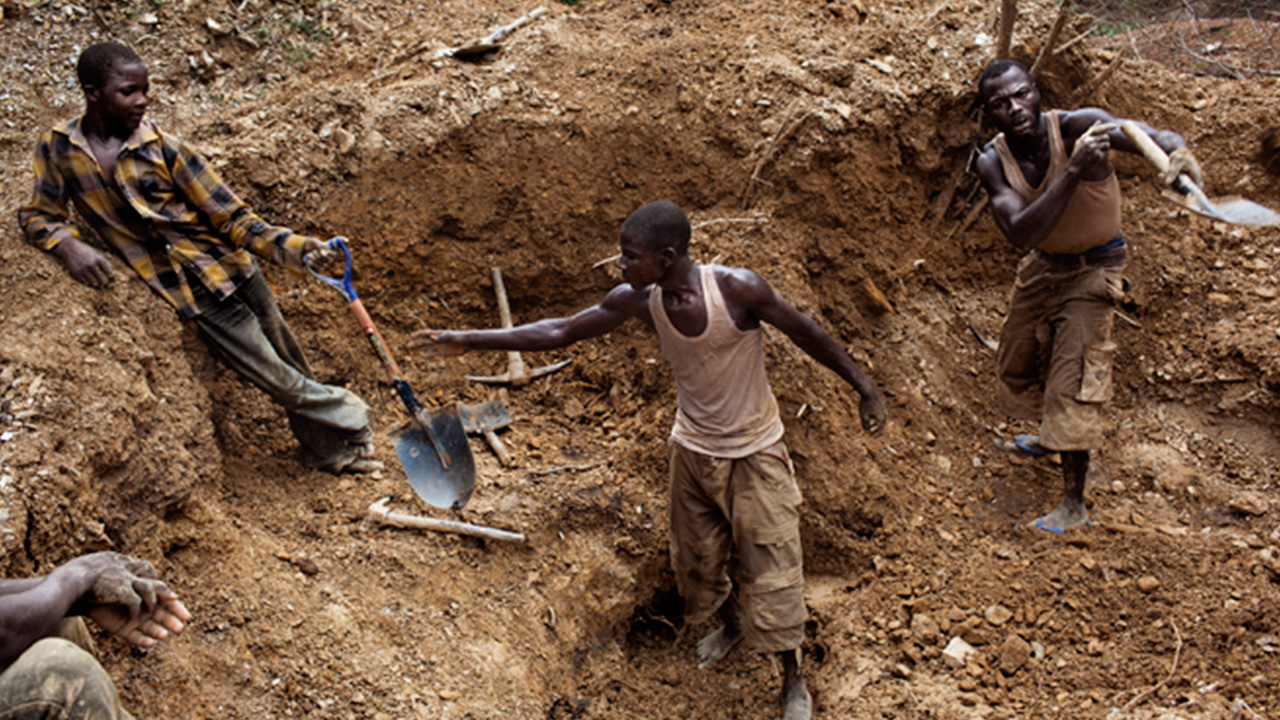General
FG Arrests 300 Illegal Miners Across Nigeria
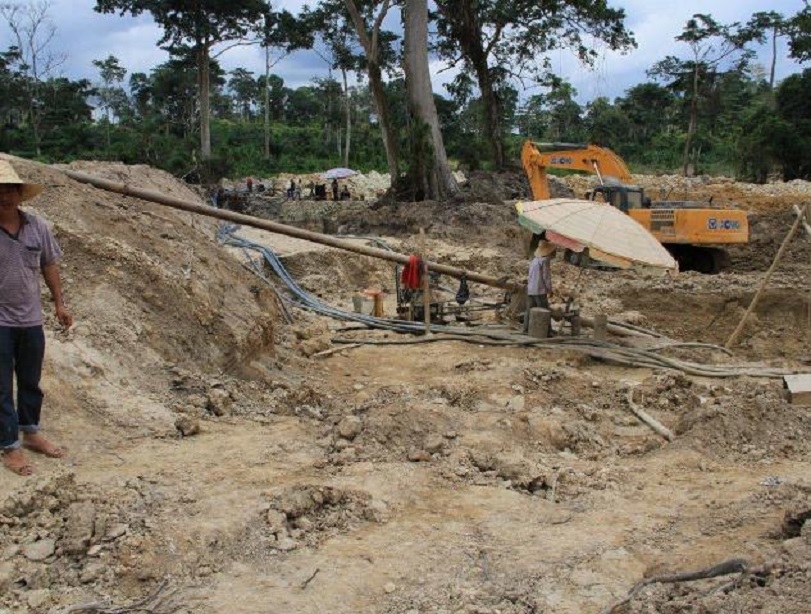
By Adedapo Adesanya
About 300 illegal miners across the country have been arrested by the federal government in a move to revitalise Nigeria’s mining sector, according to the MInsiter of Solid Minerals Development, Mr Dele Alake.
He revealed this during a strategic briefing of the House Committee on Solid Minerals’ Oversight visit to the Ministry in Abuja on Thursday.
The visit saw the unveiling of a series of transformative strides aimed at revitalising Nigeria’s mining sector by Mr Alake.
With a clear focus on the comprehensive 7-point agenda, the minister emphasised the progress made in securing Nigeria’s mining operations, deterring illegal activities, and positioning the sector as a cornerstone of economic growth.
The statement read in part, “At the forefront of this transformation is a strengthened security framework designed to combat illegal mining—a longstanding challenge that has threatened both local communities and Nigeria’s global standing.
“Since deploying over 2,000 trained mine marshals, nearly 300 illegal operators, including foreign nationals, have been apprehended, significantly reducing unauthorized mining activity across the nation.”
The minister credited the progress to the proactive support of President Bola Tinubu, which has enabled an effective inter-ministerial collaboration with the Ministry of Interior, ensuring swift deployment of resources and personnel to protect mining regions.
In addition to strengthening security, Mr Alake shared the ministry’s vision for establishing Nigeria as a global mineral hub.
According to him, targeted outreach efforts have successfully attracted the interest of leading international investors, positioning Nigeria’s mineral sector for future partnerships that promise mutual growth.
According to the Minister, with revenue on the rise and global interest growing, Nigeria’s solid minerals sector is gaining recognition as a driver of sustainable development.
He expressed gratitude for the ongoing support from Nigeria’s legislative authorities and other key partners, emphasising that these combined efforts are building a resilient foundation for the sector.
“We’re setting Nigeria’s mineral wealth on a path to growth, resilience, and international respect,” he stated, adding with a smile, “But like Oliver Twist, we ask for more. We look forward to even stronger collaboration to achieve greater milestones.”
The minister expressed optimism that with these reforms setting the stage for substantial economic contributions, Nigeria’s mining sector is on a trajectory to significantly bolster the nation’s gross domestic product.
In his remarks, the Chairman of the House Committee on Solid Minerals Development, Mr Garza Gbefwi, said the House Committee on Solid Minerals Development remained dedicated to advancing transparency, growth, and robust support for this sector.
He noted that the group has taken a more direct approach this year by engaging closely with each agency under the Ministry’s jurisdiction.
These engagements, he explained provide invaluable insights into the achievements and challenges within the sector, particularly from key agencies such as the Nigerian Geological Survey Agency (NGSA) and the Solid Minerals Development Fund (SMDF). The goal is to address any obstacles that could hinder the sector’s development.
The chairman disclosed that one of the main challenges the NGSA faces is limited financial resources, especially for fulfilling its essential mandate of generating geological data.
Mineral exploration is a highly capital-intensive activity, and sufficient funding is critical to producing reliable data that can drive the sector forward.
To that end, he advocated for increased funding to facilitate a seamless partnership between NGSA and SMDF, enabling both agencies to contribute effectively to sectoral growth.
Recognising the solid minerals sector’s importance to Nigeria’s economy, Mr Gbefwi called on the federal government to prioritise funding for its development.
He encouraged the ministry to work closely with the president and other key stakeholders to secure resources that will foster the sector’s long-term sustainability and impact.
Addressing licensing and consent challenges the Chairman, among other things, stressed that licensing for exploration and extraction is an area that requires careful handling, especially concerning community consent.
However, without a well-managed consent process, local tensions can arise once valuable resources are discovered.
He noted that a transparent and inclusive licensing framework is essential to minimise conflicts, respect community rights, and ensure harmony.
The Committee, he said, supports efforts to enhance this process as a means to foster stable, sustainable growth.
General
NIMASA Rallies Stakeholders’ to Develop National Action Plan

By Adedapo Adesanya
The Nigerian Maritime Administration and Safety Agency (NIMASA) has pledged its commitment to provide the regulatory leadership, technical coordination, and stakeholder engagement required to successfully develop and implement a robust National Action Plan on maritime decarbonization in Nigeria.
The Director General of the agency, Mr Dayo Mobereola, made this known during the National Stakeholders’ workshop on the development of a National Maritime Decarbonization Action Plan, further describing the workshop as a critical step in actualising the Federal Government’s blue economy and climate objectives.
Represented by the Executive Director, Operations, Mr Fatai Taiye Adeyemi, the NIMASA DG underscored the significance of the IMO GreenVoyage2050 Project, a technical cooperation initiative /designed to support developing countries in implementing the IMO GHG Strategy.
According to him, the National Action Plan being developed will reflect national realities, leverage existing capacities, address identified gaps, and align with broader economic and environmental priorities of the federal government.
Mr Mobereola stressed that “this transition is not merely about compliance with international obligations, it is about safeguarding our marine environment, protecting public health, strengthening the blue economy, and ensuring that our maritime industry remains competitive and future-ready”, the DG said.
Also speaking at the event was the Technical Manager of the IMO GreenVoyage2050 Project, Ms Astrid Dispert, who highlighted that the overarching objective of the initiative is to advance a coherent and globally aligned regulatory framework to accelerate maritime decarbonization.
She also emphasised that NIMASA plays a pivotal role in driving the project at the national level.
The IMO GreenVoyage2050 Project provides technical expertise and institutional support to assist countries in developing and implementing National Action Plans that promote sustainable shipping practices, encourage investment in clean technologies, and strengthen capacity for long-term emissions reduction.
Through this collaboration, the federal government is advancing deliberate steps towards maritime decarbonization, reinforcing its commitment to global climate goals and ensuring a cleaner, greener, and more sustainable future for the sector.
General
BPP Mandates Digital Submission for MDAs From March 1

By Adedapo Adesanya
The Bureau of Public Procurement (BPP) has directed all Ministries, Departments and Agencies (MDAs) to comply with its digital submission process effective March 1.
The directive was contained in a circular signed by the Director-General of the Bureau, Mr Adebowale Adedokun, noting that the move was part of the bureau’s commitment to digital transformation and paperless governance.
It explained that the transition followed an earlier circular of Aug. 4, 2025, which introduced electronic submission procedures.
According to the bureau, it has successfully moved from physical filings to a dedicated e-mail service for document submissions and is now advancing to a more robust and integrated system.
The circular announced the inauguration of the BPP Digital Submission Portal, a web-based platform designed to enable MDAs submit procurement-related documents directly to the Bureau.
It stated that the automated platform would streamline the submission process, enhance transparency and ensure accelerated tracking of procurement-related documents and petitions.
“With effect from March 1, all MDAs will be required to use the portal to submit requests for ‘No Objection’ Certificates, approvals for ‘No Objection’ for special procurements, clarifications and status updates on submissions,” the bureau said.
It added that the portal would be hosted on the Bureau’s official website and would become fully operational from the effective date.
The bureau warned that physical submissions or manual hand-deliveries would no longer be prioritised and would eventually be rejected following the full transition to the digital platform.
It urged accounting officers to brief their procurement departments and ICT units on the development to ensure seamless processing of procurement activities from March 1.
It further advised MDAs to contact the Bureau via its official email for information on the onboarding process and integration into the portal.
The bureau emphasised that full compliance by all MDAs was required to ensure a smooth transition and avoid delays in the implementation of the 2026 fiscal year procurement processes.
General
Senate Seeks Removal of CAC Boss Hussaini Magaji
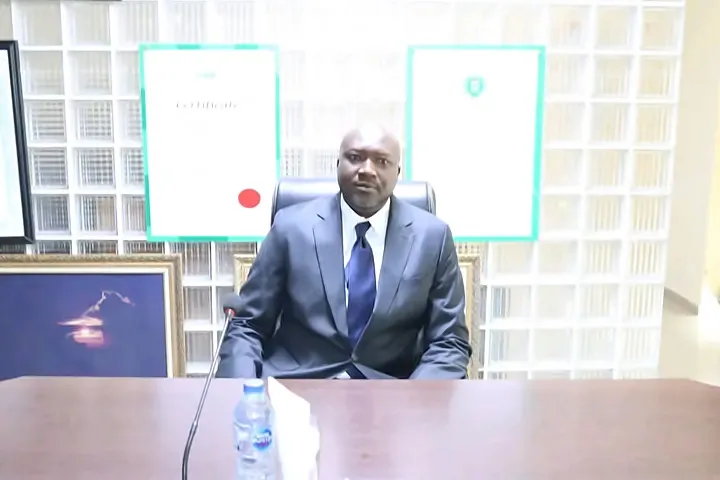
By Adedapo Adesanya
The Senate has asked President Bola Tinubu to remove the Registrar General of the Corporate Affairs Commission (CAC), Mr Hussaini Ishaq Magaji, from office.
The Senate Committee on Finance, while passing a resolution in Abuja on Thursday, accused Mr Magaji, a Senior Advocate of Nigeria (SAN), of failing to honour the Senate’s invitations to account for the finances of his agency.
“He refused on so many occasions to honour our invitation to appear before this committee.
“We have issues with the reconciliation of the revenue of CAC.
“Each time we invite him, he gives us excuses,” the Chairman of the committee, Mr Sani Musa, said as the committee passed the resolution.
CAC was part of a group of agencies that the House of Representatives Public Accounts Committee (PAC) recommended zero allocation for the year 2026, for allegedly failing to account for public funds appropriated to them.
The committee, at an investigative hearing held two weeks ago, accused CAC and some other ministries, departments and agencies (MDAs) of shunning invitations to respond to audit queries contained in the Auditor-General for the Federation’s annual reports for 2020, 2021 and 2022.
The PAC chairman, Mr Bamidele Salam, stated that the National Assembly should not continue to appropriate public funds to institutions that disregard accountability mechanisms, saying this will create fiscal discipline and strengthen transparency across federal institutions and conform with extant financial regulations and the oversight powers of the parliament.
“Public funds are held in trust for the Nigerian people. Any agency that fails to account for previous allocations, refuses to submit audited accounts, or ignores legislative summons cannot, in good conscience, expect fresh budgetary provisions. Accountability is not optional; it is a constitutional obligation,” he said.
-

 Feature/OPED6 years ago
Feature/OPED6 years agoDavos was Different this year
-
Travel/Tourism10 years ago
Lagos Seals Western Lodge Hotel In Ikorodu
-

 Showbiz3 years ago
Showbiz3 years agoEstranged Lover Releases Videos of Empress Njamah Bathing
-

 Banking8 years ago
Banking8 years agoSort Codes of GTBank Branches in Nigeria
-

 Economy3 years ago
Economy3 years agoSubsidy Removal: CNG at N130 Per Litre Cheaper Than Petrol—IPMAN
-

 Banking3 years ago
Banking3 years agoSort Codes of UBA Branches in Nigeria
-

 Banking3 years ago
Banking3 years agoFirst Bank Announces Planned Downtime
-

 Sports3 years ago
Sports3 years agoHighest Paid Nigerian Footballer – How Much Do Nigerian Footballers Earn




